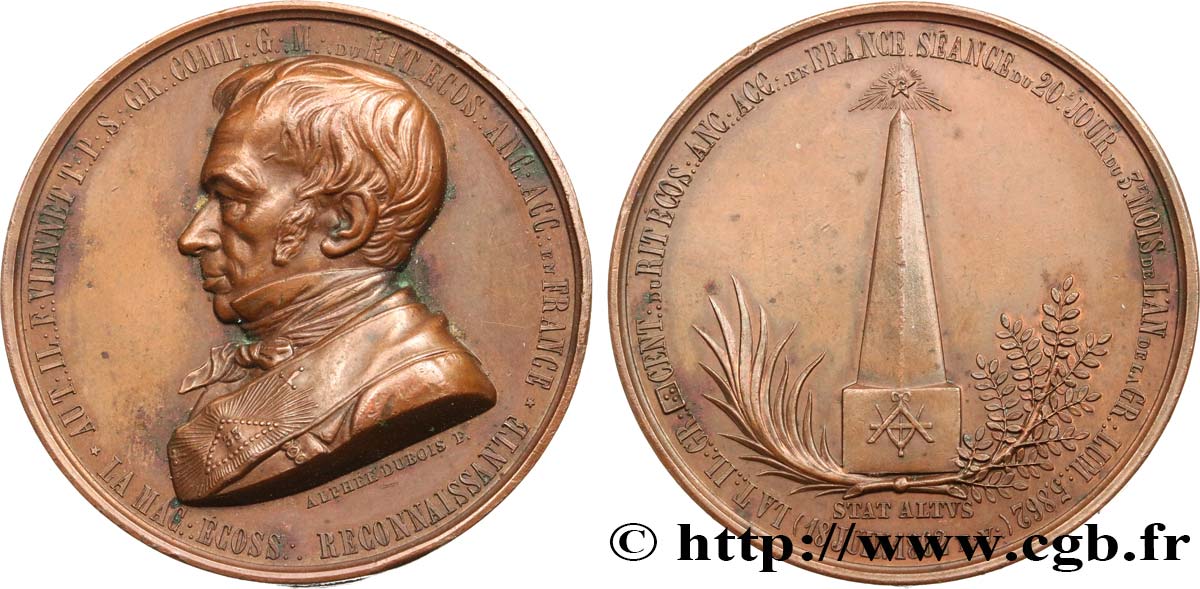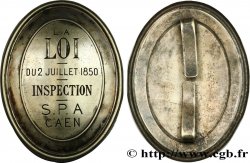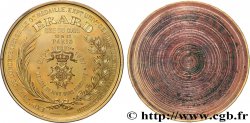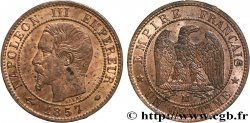E-auction 520-435659 - fme_594811 - SECOND EMPIRE Médaille maçonnique - Orient de Paris, Rite écossais
You must signin and be an approved bidder to bid, LOGIN TO BID. Accounts are subject to approval and the approval process takes place within 48 hours. Do not wait until the day a sale closes to register. Clicking on « bid » constitutes acceptance of the terms of use of cgb.fr private e-auctions.
Bids must be placed in whole Euro amounts only. The sale will start closing at the time stated on the item description; any bids received at the site after the closing time will not be executed. Transmission times may vary and bids could be rejected if you wait until the last second. For further information ckeck the E-auctions F.A.Q.
NO BUYER'S FEE.
NO BUYER'S FEE.
| Estimate : | 145 € |
| Price : | 46 € |
| Maximum bid : | 46 € |
| End of the sale : | 03 April 2023 19:43:20 |
| bidders : | 4 bidders |
Type : Médaille maçonnique - Orient de Paris, Rite écossais
Date: 1862
Mint name / Town : 75 - Paris
Metal : copper
Diameter : 51 mm
Orientation dies : 12 h.
Engraver DUBOIS Alphée (1831-1905)
Weight : 54,30 g.
Edge : lisse + abeille CUIVRE
Puncheon : Abeille (1860 - 1880) CUIVRE
Coments on the condition:
Patine hétérogène avec des taches noires. Traces de frottement dans les champs. Présence de quelques coups et rayures. Hauts reliefs sur le buste
Obverse
Obverse legend : * AU T.: IL.: F.: VIENNET T.: P.: S.: GR.: COMM.: G.: M.: DU RIT ECOS.: ANC.: ACC.: EN FRANCE* - LA MAC.: ECOSS.: RECONNAISSANTE.
Obverse description : Buste à gauche de Jean Pons Guillaume Viennet, signé : ALPHEE DUBOIS F..
Reverse
Reverse legend : LA.: T.: IL.: GR. (CARRÉ:.) CENT.: DU RIT ECOS.: ANC.: ACC.: EN FRANCE. SÉANCE DU 20E JOUR DU 3E MOIS DE L’AN DE LA GR.: LUM.: 5862 - (18 JUIN 1862 E.: V.:) // STAT ALTVS.
Reverse description : Sur une palme et un rameau d'acacia liés entre eux, obélisque dont la base porte un niveau et un compas entrecroisés, surmonté d'une étoile rayonnante portant un G.
Commentary
Intéressante médaille pour l’Orient de Paris, le Rite écossais, Suprême Conseil, avec l’effigie de Viennet.
Jean Pons Guillaume Viennet, né le 18 novembre 1777 à Béziers et mort le 10 juillet 1868 au Val-Saint-Germain, est un homme politique, poète et auteur dramatique français, membre de l'Académie française. Il est enterré au cimetière du Père-Lachaise à Paris.
Il était fils du conventionnel Jacques Joseph Viennet et neveu du prêtre Louis Esprit Viennet, qui fut, pendant quarante ans, curé de l'église Saint-Merri à Paris, et qui, en 1790, prêta serment à la constitution civile du clergé. Sa longue carrière, de militaire d'abord et d'homme public ensuite, d'écrivain dramatique et de poète, traversée par les révolutions politiques et les guerres littéraires, est pleine d'incidents et de péripéties. Il eut la capacité de s'élever sous divers pouvoirs à toutes les dignités littéraires et politiques, tout en atteignant aux dernières limites de l'impopularité. « J'ai compté, disait-il, jusqu'à cinq cents épigrammes par an contre moi ; tout échappé de collège qui entrait dans un feuilleton croyait me devoir son premier coup de pied. » Son nom a servi de tête de Turc aux républicains et aux romantiques ; mais il savait se venger par une fable ou une épître de ses ennemis les plus acharnés..
Jean Pons Guillaume Viennet, né le 18 novembre 1777 à Béziers et mort le 10 juillet 1868 au Val-Saint-Germain, est un homme politique, poète et auteur dramatique français, membre de l'Académie française. Il est enterré au cimetière du Père-Lachaise à Paris.
Il était fils du conventionnel Jacques Joseph Viennet et neveu du prêtre Louis Esprit Viennet, qui fut, pendant quarante ans, curé de l'église Saint-Merri à Paris, et qui, en 1790, prêta serment à la constitution civile du clergé. Sa longue carrière, de militaire d'abord et d'homme public ensuite, d'écrivain dramatique et de poète, traversée par les révolutions politiques et les guerres littéraires, est pleine d'incidents et de péripéties. Il eut la capacité de s'élever sous divers pouvoirs à toutes les dignités littéraires et politiques, tout en atteignant aux dernières limites de l'impopularité. « J'ai compté, disait-il, jusqu'à cinq cents épigrammes par an contre moi ; tout échappé de collège qui entrait dans un feuilleton croyait me devoir son premier coup de pied. » Son nom a servi de tête de Turc aux républicains et aux romantiques ; mais il savait se venger par une fable ou une épître de ses ennemis les plus acharnés..








 Report a mistake
Report a mistake Print the page
Print the page Share my selection
Share my selection Ask a question
Ask a question Consign / sell
Consign / sell
 Full data
Full data



